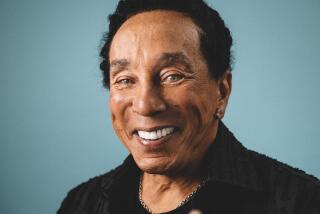COMMENTARY : A Psychoanalysis of Strawberry
- Share via
My analyst phoned the other day; he wanted to talk about Darryl Strawberry. Obviously. Strawberry fascinates my analyst.
Has there been a sports figure in New York more analyzed and psychoanalyzed than Strawberry? Why does he? And--more often--why doesn’t he? He doesn’t even have to be lying down to be on the couch.
And now the New York Mets right fielder is hitting like anything, which was just what he wasn’t doing. And why didn’t he do it before?
Here is this volatile athlete who has run a boundless career into a barrier, was treated for a problem identified as alcoholism, and who is in the prickly last year of his contract. Clearly, he is an enigma wrapped in a dilemma.
Ted Saretsky is a psychoanalyst and clinical professor of psychoanalysis at Adelphi University. He is fascinated by Strawberry’s psychological profile as much as he loves Strawberry’s swing.
Psychiatry is still an inexact science, like the art of scouting baseball talent. Two weeks ago Saretsky prescribed “patience,” even though he recognizes Strawberry has been, in most clinical terms, “a real pill.” His prognosis is a definite maybe.
He said it was only normal for a person who comes out of treatment for alcoholism to be submerged in depression, and then to emerge. You know, 90 percent of baseball is half mental.
The classic case was Darrell Porter, a wonderfully aggressive catcher who came out of drug treatment and an immersion in religion as a totally passive player whose career soon ended.
Teammates saw no fire in Strawberry; he was never a passive hitter until last season. He grumbled about the bench not being supportive and vowed to be gone from New York because Davey Johnson was fired. Goodness knows, Strawberry’s performance and behavior helped push Johnson out the door.
After the layer of addictive behavior is treated, Saretsky said, what remains is frequently “core behavior.” It is what drove the person to be addictive.
Symptoms would include “difficulty in concentrating, difficulty in making decisions, mood swings, feelings of resentment, being argumentative and being easily irritated. They can make him seem uncaring and insensitive to teammates and family members, and he could seem unmotivated and unprepared.”
From that, comes “a mishmash of acting out bad behavior.”
This diagnosis comes from watching games, reading newspapers and watching television. Saretsky often sounds as if he had observed the clubhouse, too. “What happens in good treatment is the more outlandish aspects of behavior subside and what you’re left with is the depression,” he said. “Even though a depressive doesn’t sound so great, it’s a healthier aspect.”
Ballplayers often motivate each other with goading. Teammates have been uncertain of how to approach Strawberry. Manager Bud Harrelson is probably more attuned to psychology than Johnson was, but to Strawberry the change of managers represented one more part of life out of his control.
“The person who thrives best is relatively independent,” Saretsky said. “He takes his work very seriously and gets down on himself when he doesn’t do well, but it doesn’t become his whole life. A person with Strawberry’s disposition is going to be very vulnerable to things that inevitably happen to all of us: not being perfect.”
That makes him easily derailed. Saretsky recalled how New York Giants Manager Leo Durocher could drive Brooklyn Dodgers pitcher Don Newcombe to distraction by screaming from the third-base coach’s box. “Somehow Strawberry has to raise his threshold to things like that,” Saretsky said.
It would ease his life if Strawberry developed more aspects of his personality, but he didn’t get to the big leagues as an oil painter. Growing up in a broken home is never left behind entirely. “Frequently when people have impoverished childhoods as Strawberry did -- not financially but in terms of loving -- they compensate by childhood feelings of omnipotence and grandiosity,” Saretsky said . “For those fortunate few who can combine that with a genuine skill, it can be a ride to the top. If the personality is fragile besides, and people expect you to be a black Ted Williams, you can crack from the strain. It’s almost as if your entire personal identity is based on facing the pitcher.
“People who have high potential and who have actual success early in their careers and their happiness is too intimately tied to their success at work, at some point there’s going to be a breakdown, as there was in Strawberry’s case.”
My analyst was sure Strawberry’s recovery would take him past the passive period. “When he came out of it, as he may be, I would expect he could harness the aggression to lash out at the ball,” Saretsky said, “rather than leave it to turn inward and become self-destructive.”
In his last 17 games before Monday night, Strawberry scalded the ball at .375 with eight home runs and 17 RBI. Now, should the Mets offer him a big contract to keep him, or not? What he is doing now they won’t get anyplace else. But who knows how long it will last?
“If I were advising (Mets general manager) Frank Cashen, I’d ask him how many years he wanted,” Saretsky said. “I’d ask, would you take Darryl Strawberry as he is for the next three years -- with all the ups and downs? Because that’s what you can look forward to.”
Personally, I would like to see a little more before I decide.
More to Read
Go beyond the scoreboard
Get the latest on L.A.'s teams in the daily Sports Report newsletter.
You may occasionally receive promotional content from the Los Angeles Times.








